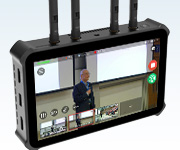|
|
|
|
 
|
Featured Story
 |
| (Getty Images) |
Larry DeFazio, Regional Sales Manager, East, Professional Display Solutions at Sony Electronics, shares insights on emerging trends and how AV/IT technologies are reshaping higher education classrooms and beyond.
|
|
|
 | New! All-in-One Live Production & Streaming
Magewell's new Director One combines the proven AV/IP input flexibility, powerful production tools (switching, graphics, instant replay and more) and versatile control options of our popular Director Mini with a larger (7") AMOLED touchscreen, built-in cellular modem and more. Learn more. |
|---|
| |
|
|
 
|
Top Stories
|
Generative AI has dramatically disrupted education, exposing outdated teaching models and prompting rapid adaptation across institutions, writes Alex Goryachev, a strategic AI adviser. Students quickly adopted AI tools for coursework and innovation, while faculty and administrators scrambled to respond. The most successful educational systems are those that embrace generative AI, integrating it into curriculum design, student services and workforce preparation, rather than attempting to resist or ignore the transformation.
|
|
|
Liberal arts colleges are increasingly adopting microcredentials to address changing market demands and workforce readiness pressures. While community colleges and research universities have moved quickly, liberal arts schools have faced barriers due to faculty governance and accreditation standards. However, growing employer interest in skills-based hiring and student demand for career-relevant programs are accelerating adoption. Institutions like Allegheny College and Mount Saint Mary's University have launched microcredential initiatives tailored to in-demand fields such as artificial intelligence and cybersecurity, signaling a shift toward integrating these credentials in the liberal arts sector.
|
|
|
Mike Evans, a Georgia State University professor, has integrated the Civic Online Reasoning curriculum into his American Government course to combat misinformation among students, who increasingly rely on social media for news. The curriculum, developed by Stanford University, teaches skills such as lateral reading to assess online information credibility. In an experiment involving nearly 3,500 students, digital literacy improved by 18% and 80% reported learning valuable skills.
|
|
|
|
Free eBooks and Resources
|
 
| Got this from a friend? Subscribe now and stay in the loop! |
|
 |
|
| |
| Relevance is a quality that others give to you. One cannot self-crown himself relevant. |
Giorgio Armani,
fashion designer
1934-2025 |
|
| |
 |
|
|
  |
|
|
|
|
|
| Copyright © 2025 SmartBrief. All Rights Reserved. A division of Future US LLC. |
| Full 7th Floor, 130 West 42nd Street, New York, NY, 10036. |
|
|
|
|

